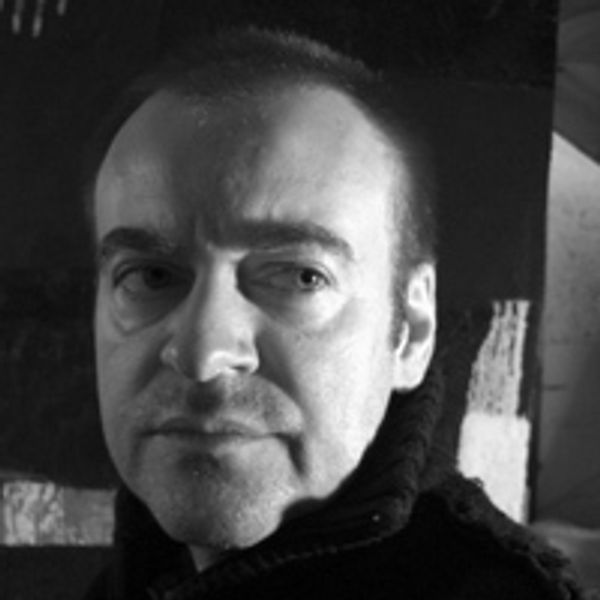Malak Mattar, Untitled (detail), 2024, charcoal on paper
from Kopenhaga
Translated from the Polish by Piotr Gwiazda
Where are you from? Where are you from? Hvor kommer du fra?_ The most
common question, by Copenhagen’s standards. Where did you come from? How
long have you lived here? Hvor kommer du fra? The question asked in taxis and
at Pakistani vegetable stands. On the street, in the Thai massage parlor, during
sleep and waking. Hvor kommer du fra? Regardless of your skin color and the
contents of your wallet. _Hvor kommer du fra?
_ The best strategy is to pretend you are mute. Or—as Steve did—to retreat
to your roots, your native language. Steve is from London. After twenty years in
Copenhagen (wife a six-foot Dane, father-in-law works at Carlsberg, apartment
walls draped with flags with a white cross, etc.), after twenty years of patiently
answering the question Hvor kommer du fra?, Steve finally broke down. These
days he only speaks London slang. And nobody understands him anymore.
Nobody even tries to understand him. Finally, Steve is a free man. I envy him.
(No confusion, no questions about Queen Elizabeth’s teeth!) He has impressed
me. I should probably do the same soon. I will start to “communicate” in the
language of Lower Mokotów. No matter whether I manage to buy tomatoes –
Hvor kommer du fra?—take a taxi—Where are you from? Hvor kommer du fra?
—visit a brothel—_Where are you from?—_in Vesterbro—_Hvor kommer du fra???
_ Necessary explanation: Polish patriots (who have lived in Denmark for ages
or just a few seasons), fellows who know absolutely everything about the local
nuances and customs, argue that the question Hvor kommer du fra? is the proof of
the kindness of the Danes. Proof of their willingness to assist you (even if you
don’t need assistance). After all, the Danish language is too difficult; it’s better to
be specific and reasonable right away. To maintain healthy distance. Down with
the effusiveness of foreign, mentally unorganized nations! Where are you from?
Hvor kommer du fra? How many years have you been living here?
Why does Lech Wałęsa no longer wear flannel shirts? Exactly.
~
More and more homeless among foreigners living in Denmark. At the welfare
office in Vesterbro about 40% are males coming from Africa or Asia. No one
mentions the Poles. That’s because Poles assimilate. They drink only after hours,
save money, try to stay above the surface. When they reach old age, they return
to their country and invest in summer cottages by the sea. (And what about me?
What will I be in a few years? Will I even be alive?)
~
Something strange and indecent about people who suddenly dispose of their
libraries. Recently, the wealthy R. arrived with a carton of books; he is moving
and in his new apartment (probably bigger than the previous one) there won’t be
enough space for them. This is how Formy by Tadeusz Różewicz (Czytelnik,
Warsaw, 1958, 1st ed.) ended up in Christianshavn. Last sentence of the volume:
“Through all this turmoil we walk toward silence, toward explanation.”
~
Young, beautiful woman at the bus stop. Athletic body, charismatic features…
Watching her, I imagine how she will look in thirty or forty years. My unstoppable,
sick imagination: everywhere I look, I see (smell) decay. I’m reminded of Robert
Frank’s brilliant photograph 14th Street, New York City, 1948. Five plump (as was
fashionable in those times) women. They look content, smoking cigarettes. (Hot
chocolate costs ten cents, tea five, a cheeseburger twenty-five). Are any of them still alive?
The world is concrete. Frank’s photographs have gained a well-deserved recognition:
“Robert Frank is one of today’s leading visual artists.” And never a word about
those five beauties.
~
Thirty-seven years. I have lived long enough and have witnessed many
“emotional” scenes. Danes say that I’m only middle-aged. In the times of the
Vikings, they would consider me an elder, a magician, a shaman…
~
The greatest gift is Sleep. Even with nightmares. Sleep! Sleep—and not this
obsessive vigil. Waiting for Something—for Someone? At night, alcohol, pills.
Again without success… Let it come at last! I pray only for Sleep.
~
How disappointed you must be, poor wasp! You circled around my whole
kitchen (even flew into the room and bathroom), not noticing the basket I had
prepared especially for your visit (next to the half-open window) with a pear, a
bunch of ripe grapes, and half an apple. Do you prefer the loud Italian ice cream
vendor and his constant attempts on your short life?
~
Darko—my friend from Sarajevo. We forgive each other even our political
views. But when he served me a ram’s head—I firmly refused.
Grzegorz Wróblewski, born in Gdańsk and raised in Warsaw, has been living in Copenhagen since 1985. He is the author of numerous books of poetry, prose, and drama. Kopenhaga, a volume of prose poems, first appeared in Poland in 2000. His work has been translated into eight languages. (11/2010)
Piotr Gwiazda teaches at the University of Maryland Baltimore County. His poems and translations have recently appeared in Calque, DIAGRAM, Faultline, Linebreak, No Tell Motel, and With+Stand. He is the author of Gagarin Street: Poems (WWPH, 2005). (11/2010)

Grzegorz Wróblewski, born in Gdańsk and raised in Warsaw, has been living in Copenhagen since 1985. He is the author of numerous books of poetry, prose, and drama. Kopenhaga, a volume of prose poems, first appeared in Poland in 2000. His work has been translated into eight languages. (updated 11/2010)

Piotr Gwiazda teaches at the University of Maryland Baltimore County. His poems and translations have recently appeared in Calque, DIAGRAM, Faultline, Linebreak, No Tell Motel, and With+Stand. He is the author of Gagarin Street: Poems (WWPH, 2005). (updated 11/2010)
